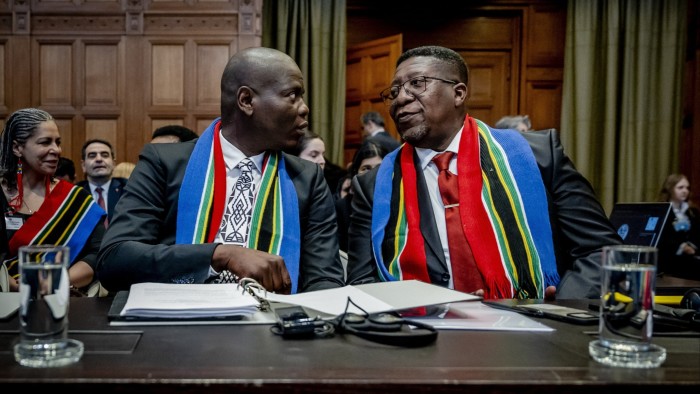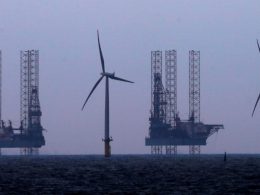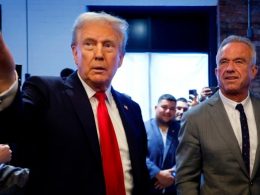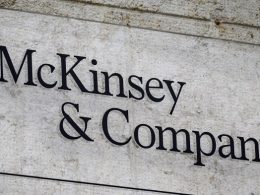Unlock the White House Watch newsletter for free
Your guide to what the 2024 US election means for Washington and the world
South Africa’s foreign minister has vowed to push ahead with its genocide case against Israel at the International Court of Justice despite an executive order signed by Donald Trump punishing the country for its “aggressive” position towards the US ally.
There was “no chance” of South Africa withdrawing the ICJ case despite Trump’s threats, Ronald Lamola told the Financial Times. “Standing by our principles sometimes has consequences, but we remain firm that this is important for the world, and the rule of law,” he said in an interview.
South Africa instigated proceedings against Israel at ICJ at the end of 2023, accusing Israel of violating international laws on genocide during its war against Hamas in Gaza, something Israel vigorously denies. While a final ruling is pending, the court last year imposed emergency measures ordering Israel to limit harm.
The US president last week signed an order to “halt foreign aid or assistance” to South Africa in retaliation for the ICJ case and a new land expropriation law it claims is designed to seize property from the country’s Afrikaner minority, even offering to resettle “Afrikaner refugees escaping government-sponsored race-based discrimination”.
The US also alleged South Africa was working with Iran “to develop commercial, military and nuclear arrangements”, while secretary of state Marco Rubio said he would skip a G20 meeting in South Africa — this year’s host — over what he characterised as its “DEI” policies.
Trump’s campaign against South Africa has become a major challenge for the coalition government, which fears that not only $440mn in aid but tariff-free access to US markets under the African Growth and Opportunity Act (Agoa) is at risk.
Lamola has described the US’s claims as “misinformation”, with officials saying the land law is not “arbitrary” but necessary to redress inequities in land ownership after apartheid. “While we do have a good relationship with Iran, we don’t have any nuclear programmes with them, nor any trade to speak of,” he said.
Lamola said South Africa sought “urgent engagement” with the US. “We are willing to engage with them to persuade them, if they are willing to be persuaded,” he said.
But the coalition government, which took power last year after the African National Congress lost its majority in general elections, is divided on how to manage the fallout.
John Steenhuisen, leader of the ANC’s pro-business partner the Democratic Alliance, agreed South Africa must urgently patch up relations with Trump.
“It is a clear and present danger to our growth and jobs agenda if we’re not able to repair the relationship with one of our largest trading partners and the largest economy of the world,” he said, adding that everything from farming jobs to investment could be affected.
But Steenhuisen blamed the ANC for creating friction with Washington through what he called “cosying up to Russia” and the “stench” around dealings with Iran. The DA is opposing the passage of the expropriation law in court.
However, he urged Washington to cut the government some slack, saying it was not possible for South Africa to withdraw from the ICJ case.
“There is no mass expropriation of land without compensation,” he said, adding that he did not believe Afrikaner farmers were being targeted for murder as some have claimed.
Songezo Zibi, leader of the centrist Rise Mzansi party, another coalition member, argued that “there’s literally nothing South Africa could do to please the Trump administration”.
The deepening spat “might be presented as if it’s about South Africa, but it is bigger than that”, he added, characterising it as a broader campaign against multilateralism.
Afrikaner groups have largely rejected Trump’s asylum offer. Afriforum, a local lobby group for Afrikaner interests, said less than 1 per cent of its 300,000 members had shown any interest in becoming refugees in the US.
“The majority of Afrikaners won’t want to go. We are thankful of Trump’s effort to help. But in the longer-term, for the survival of the Afrikaners, we need to find solutions locally,” Afriforum chief executive Kallie Kriel said.
Analysts warn that the potential loss of tariff-free access to the US if Agoa is withdrawn would hit industries hard. South Africa exported about $3.6bn of goods under the act last year.
“This would be a serious knock,” said Jaco Minnaar, president of AgriSA, the largest farming association, adding that it would damage one of the best-performing parts of the struggling economy. “The bottom line is, if we lose Agoa, the average South African would be far worse off.”
Source link









